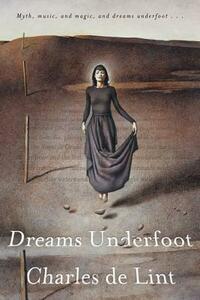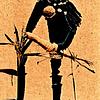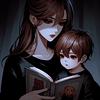Take a photo of a barcode or cover
adventurous
emotional
mysterious
reflective
sad
medium-paced
Plot or Character Driven:
Character
Strong character development:
Yes
Loveable characters:
Yes
Diverse cast of characters:
Yes
Flaws of characters a main focus:
Yes
Many of the stories felt really meaningful, like they had something to say. Others, I didn’t feel so connected to.
I loved getting to know Newford and looking out for the connections between each of the stories and characters.
I loved getting to know Newford and looking out for the connections between each of the stories and characters.
adventurous
lighthearted
medium-paced
Plot or Character Driven:
A mix
Strong character development:
No
Loveable characters:
No
Diverse cast of characters:
No
Flaws of characters a main focus:
No
Judging by the fact that it took me at least three years (if I recall correctly) to make it through this book, I don't know that I would recommend it as a good place to start with the Newford books. Every story quickly becomes very samey and less satisfying, like eating mouthful after mouthful of cotton candy until you have sticky hands, an empty bag and a stomachache.
I have enjoyed several of de Lint's other books and will probably return to another Newford book at some point, but it probably won't be terribly soon. And in the future I won't try to read them in order!
I have enjoyed several of de Lint's other books and will probably return to another Newford book at some point, but it probably won't be terribly soon. And in the future I won't try to read them in order!
adventurous
mysterious
reflective
medium-paced
Plot or Character Driven:
A mix
Strong character development:
Yes
Loveable characters:
Yes
Diverse cast of characters:
Yes
Flaws of characters a main focus:
Complicated
This was more of a 3.5 to me. I really liked the format of this book. It was several short stories, but the book connected them enough that they flowed like a full story. I got attached to quite a few of the characters and only had a few stories I didn't enjoy.
This book was a real mixed bag of stories! I found myself quite intrigued by De Lint’s fixation with trauma and found his use of it quite unsettling. He has some incredible prose but the narrative voice in these stories wasn’t strong enough for me to want to read every story and savour their essence. All the stories were set in the same place with the same cast of characters popping up here and there. Not my best intro to De Lint’s work but may have a go again.
The first Charles De Lint I read, and it sent me into a long-standing devotion for his books. I don't read and reread them with the same fierce devotion as previously, but they're great reads and this collection of short stories is the perfect place to start.
I really enjoyed some of the stories in this collection. I really liked how most of the characters were connected. I can't wait to read more of the Newford books.
On a scale of 1 to 1 trillion, words cannot describe how highly I would score the pretentiousness of this book. It's so pretentious I have no idea where to start with my criticism of its' over serious pomposity.
So... where to start? Well, I'd start with the damn introduction, an introduction that has the... (I don't want to say gall, so I'll say...) confidence to claim that de Lint is an author of the quality of Isabel Allende (at least in terms related to magical realism), and that the only reason de Lint isn't recognised is because he writes genre fiction.
Now I wouldn't mind if the short stories were actually any good, but they weren't. Most are 20-odd pages of all build up and no closure. An example is a story about a kid who thinks that bicycles have a mind of their own, and breaks locks to set them free. As this is the fantasy genre we can as, is he crazy, or...? Well, who knows. We don't even get to a position where we can have a good argument about it (within the confines of the story -I don't actually think bikes have souls). There isn't even the chance to think about the continuity of belief systems and the shared nature of some delusions, because the narrator is as bemused by the kid at the end of the story as she is at the beginning.
And it's like that all the way through. He sets up story after story where there is the potential for these discussions to be had, but with no follow through.
The second thing is I know there's a division between those who are Star Trek and those who are Star Wars. The technical vs. the mystical. And I know I'm very much Star Trek, rather than Star Wars, but part of me feels even die hard Star Wars fans would struggle with the complete lack of explanation of fantastical beliefs in this book, and the condescension with which believers hold non-believers. Maybe I lived in Texas too long, but I found that resonated with some of the experiences I had, and one or two of the people I met there too much.
Another thing is the repeated use of the word punker to describe a certain type of character in the book. I can't work out really why it grated to much, but it certainly made me feel the book had dated, and not in a particularly good way.
My final grumble is that it reminded too much of the final series of the British tv show A League of Gentlemen, where a final scene to the series is built to throughout the series, effectively answering how did the focus of the episode got there. The only problem is this book isn't funny (which is a relief, as it isn't meant to be), and there isn't the payoff at the end, which is a shame, because it was alluded to in that pretentious introduction again, and had me wondering (at least a little) how all this tut ties together.
So all in, I'm not impressed. I won't be reading that again, or any other de Lint book for that matter.
So... where to start? Well, I'd start with the damn introduction, an introduction that has the... (I don't want to say gall, so I'll say...) confidence to claim that de Lint is an author of the quality of Isabel Allende (at least in terms related to magical realism), and that the only reason de Lint isn't recognised is because he writes genre fiction.
Now I wouldn't mind if the short stories were actually any good, but they weren't. Most are 20-odd pages of all build up and no closure. An example is a story about a kid who thinks that bicycles have a mind of their own, and breaks locks to set them free. As this is the fantasy genre we can as, is he crazy, or...? Well, who knows. We don't even get to a position where we can have a good argument about it (within the confines of the story -I don't actually think bikes have souls). There isn't even the chance to think about the continuity of belief systems and the shared nature of some delusions, because the narrator is as bemused by the kid at the end of the story as she is at the beginning.
And it's like that all the way through. He sets up story after story where there is the potential for these discussions to be had, but with no follow through.
The second thing is I know there's a division between those who are Star Trek and those who are Star Wars. The technical vs. the mystical. And I know I'm very much Star Trek, rather than Star Wars, but part of me feels even die hard Star Wars fans would struggle with the complete lack of explanation of fantastical beliefs in this book, and the condescension with which believers hold non-believers. Maybe I lived in Texas too long, but I found that resonated with some of the experiences I had, and one or two of the people I met there too much.
Another thing is the repeated use of the word punker to describe a certain type of character in the book. I can't work out really why it grated to much, but it certainly made me feel the book had dated, and not in a particularly good way.
My final grumble is that it reminded too much of the final series of the British tv show A League of Gentlemen, where a final scene to the series is built to throughout the series, effectively answering how did the focus of the episode got there. The only problem is this book isn't funny (which is a relief, as it isn't meant to be), and there isn't the payoff at the end, which is a shame, because it was alluded to in that pretentious introduction again, and had me wondering (at least a little) how all this tut ties together.
So all in, I'm not impressed. I won't be reading that again, or any other de Lint book for that matter.
dark
emotional
tense
medium-paced
Plot or Character Driven:
A mix
Strong character development:
Complicated
Loveable characters:
Complicated
Diverse cast of characters:
Complicated
Flaws of characters a main focus:
Yes
I came to Charles De Lint's Newford series late, starting with the two Juniper Wiles books (#s 21 and 22 in the series) and bouncing to the intense The Onion Girl (#8). This collection of short stories is listed as the first in the series and provides an introduction into some of the recurring characters in the series. Newford is a fictional American city in De Lint's world of urban fantasy/ urban magic/ magic realism.
Like many short story collections, some are engaging, some less so. Which are which depends on the reader. My favorites were "Winter Was Hard", "Ghosts of Wind and Shadow", "The Conjure Man," and the "Timeskip"-"Paper Jack" combo.
I read this one in small doses - never more than a single story in a day - to let the stories sink in. Some of the stories can be draining. Although these stories give us glimpses into the lives of the characters, they don't allow for full character development. One exception is "In the House of My Enemy," which gives us a hard look at the abusive childhood of Jilly Coppercorn (this story also appears in The Onion Girl).
I will likely explore more of the Newford series.
Like many short story collections, some are engaging, some less so. Which are which depends on the reader. My favorites were "Winter Was Hard", "Ghosts of Wind and Shadow", "The Conjure Man," and the "Timeskip"-"Paper Jack" combo.
I read this one in small doses - never more than a single story in a day - to let the stories sink in. Some of the stories can be draining. Although these stories give us glimpses into the lives of the characters, they don't allow for full character development. One exception is "In the House of My Enemy," which gives us a hard look at the abusive childhood of Jilly Coppercorn (this story also appears in The Onion Girl).
I will likely explore more of the Newford series.





